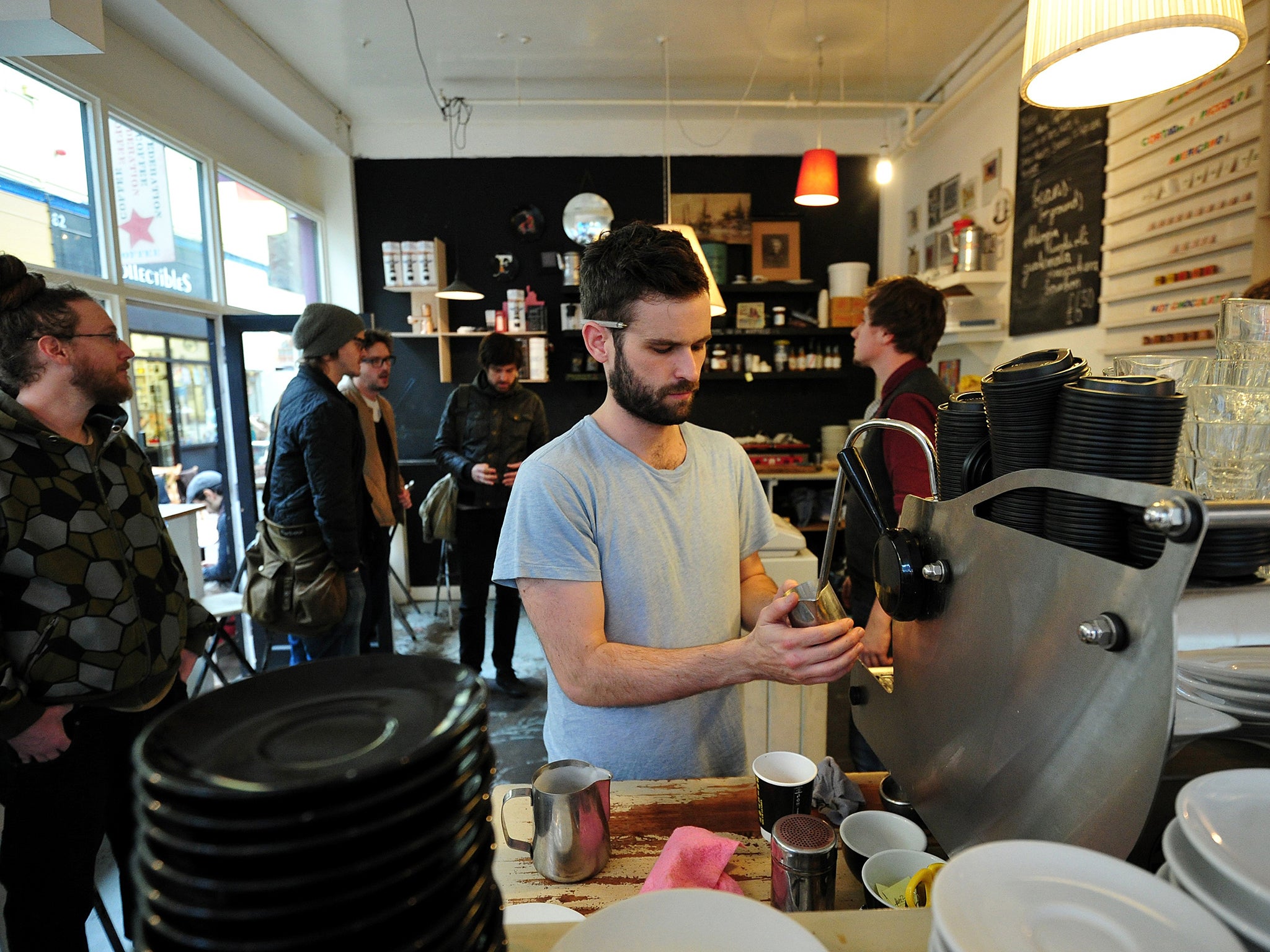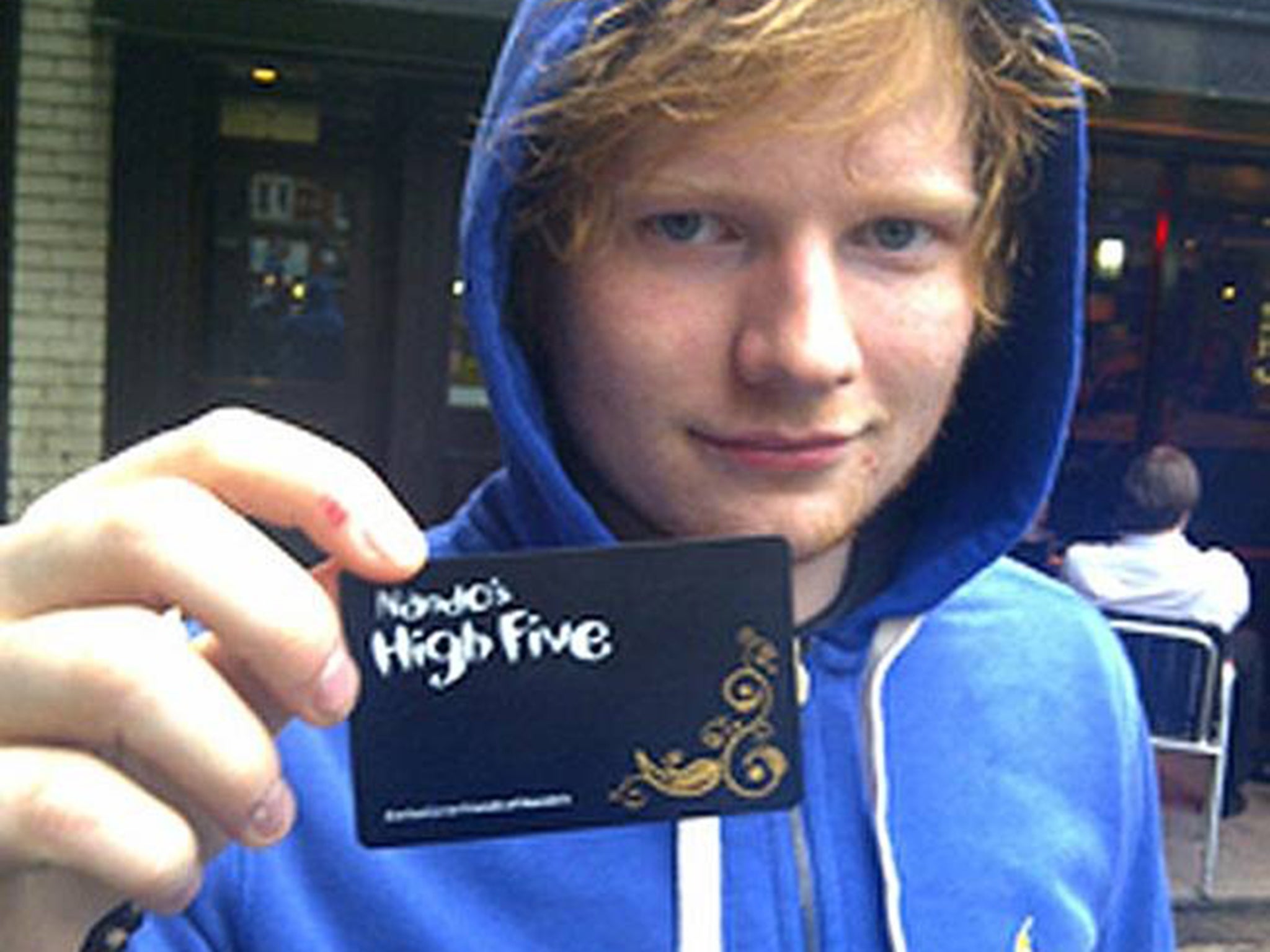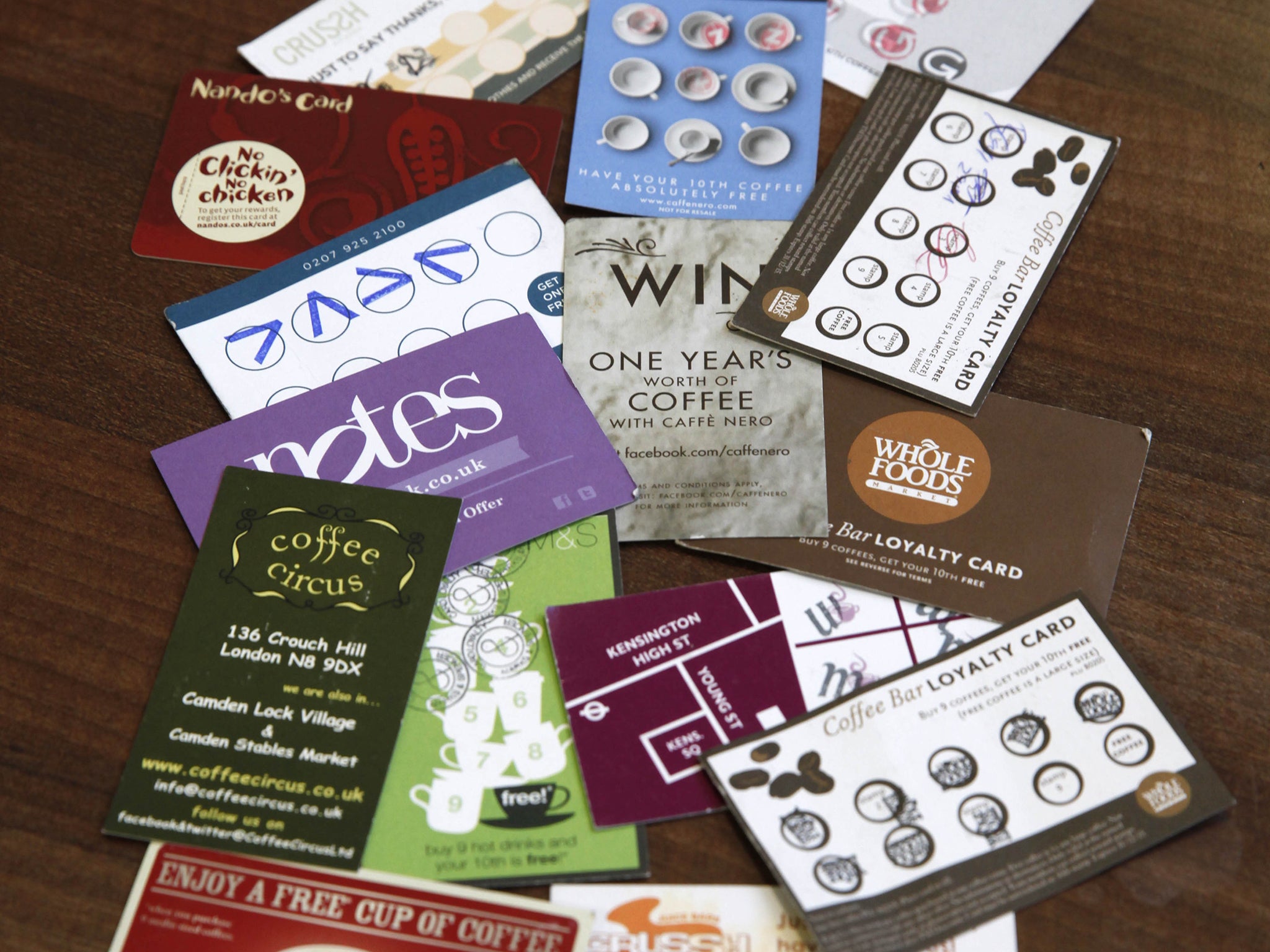Who really benefits from loyalty cards, members-club offers and random freebies?
Cafés and restaurant chains desperate for our custom are offering a mixed platter of loyalty incentives, from reward cards and membership apps to random freebies. Meg Carter investigates

Your support helps us to tell the story
From reproductive rights to climate change to Big Tech, The Independent is on the ground when the story is developing. Whether it's investigating the financials of Elon Musk's pro-Trump PAC or producing our latest documentary, 'The A Word', which shines a light on the American women fighting for reproductive rights, we know how important it is to parse out the facts from the messaging.
At such a critical moment in US history, we need reporters on the ground. Your donation allows us to keep sending journalists to speak to both sides of the story.
The Independent is trusted by Americans across the entire political spectrum. And unlike many other quality news outlets, we choose not to lock Americans out of our reporting and analysis with paywalls. We believe quality journalism should be available to everyone, paid for by those who can afford it.
Your support makes all the difference.On the British high street, those in search of a cup of coffee or a casual meal are not short of options. Costa and Starbucks stores jostle for space with Pizza Express, Nando's and Pret A Manger. For chains such as these, competition is fierce and getting fiercer. That's why adding loyalty to the menu is a growing priority for Britain's restaurateurs, whose mixed platter of incentives range from points-based rewards cards to smartphone apps and membership schemes. But as efforts increase, it's clear that carrots alone won't turn the one-time visitor into a regular diner.
It's all about random acts of kindness at sandwich chain Pret A Manger, whose chief executive Clive Schlee last week revealed that staff in his outlets are licensed to give free drinks and food to any customer who takes their fancy.
"Team members tell us they often give away treats to their regulars and to customers they think are in need of cheering up," a company spokesperson expanded.
Needless to say, the revelation caused something of a media frenzy, with numerous coffee-lovers attempting to prove their worthiness of a freebie. But it also provoked heated debate, with some criticising the policy for being "subjective" and "inauthentic".
"I love a Pret sarnie as much as the next person," says Sarah Marshall, board account director at brand activation agency Arc, "but rewarding customers who make an impression on their server stopped me in my tracks – fear of rejection, being publicly outed as a loser unworthy of a free coffee is just too much for a fragile ego to bear."
Joel Biswas, head of brand planning at brand storytelling agency Aesop, disagrees. "Big chains have long delivered consistency, but after a while consistency is boring," he says. "More valuable is a workforce that adds genuine human warmth to what is basically a transaction." And, he points out, that comes from "a genuine service culture of genuinely nice employees who seem to enjoy what they do" – like Pret's.
With a branch on every corner, coffee shops and sandwich bars risk being just another take-out commodity. So it's hardly surprising that they have been at the forefront of the hospitality sector's efforts to build loyalty.
In the beginning, there were simple cards – such as Caffe Nero's, with which customers get a stamp for every drink purchase and, with the 10th, get a drink for free. Then others went further. Costa Coffee, for example, started its points-based Costa Coffee Club card, with which customers earn points per £1 spent to use on any Costa product in any outlet. Costa invited customers to register details to "join" and, in return, they received related promotional offers and branded messages via email.

Costa Coffee Club quickly built into an important customer database and rolling customer feedback survey for Costa owner Whitbread, which claims club members spend more per transaction and visit more frequently.
Card-based schemes took a step up with the development of smartphone apps such as Starbucks', which allows customers to use their phones to collect stars earned per purchase and additional rewards. They can also use the app to pre-order and pay without cash.
It was Nando's approach to building loyalty, however, that sparked recent and growing interest among the majority of British restaurants without formal loyalty schemes. Using the chain's Nando's Card, customers earn "chillies" per visit to get free food and enjoy greater flexibility in both monitoring rewards earned digitally and redeeming them in-brand.
Furthermore, Nando's operates the High 5 – or Black Card – for an exclusive elite to enjoy free Nando's for a whole year. Self-declared Black Card owners include Ed Sheeran, who has even tweeted pictures of himself holding one. However, the company is eager to downplay the card's existence on its web site: "Can you be sure it really exists?" it asks. "All we can tell you is that no one who's requested a card, no matter how politely, has received one."
Other restaurants have been far slower to adopt structured loyalty schemes. In part, observers suggest, this is due to an over-reliance during the recession on discounting – a dangerous habit that the likes of Café Rouge, Strada and Pizza Express, with their "two for ones", are now finding hard to break.
"The net effect was customers came to expect it, and many now won't visit some of these places without a money-off discount," Simon Hathaway, global head of retail experience at marketing agency Cheil, explains. "That's why the next step has to be a move away from subsidising covers to focus instead on adding value. And as high streets increasingly become leisure destinations and competition among casual dining outlets continues to increase, everyone will need a value focus."
Ian Howe, head of marketing at Jamie Oliver Enterprises, certainly thinks so. And he claims significant success for the two year-old membership scheme for the 40 UK outlet-strong Jamie's Italian restaurant chain, which now boasts 250,000 members. Sign-up is by providing your name, contact information and a few other details, including whether or not you have children and any eating or drinking preferences, he explains.
On presentation of your card, the restaurant can see how often you've visited, with how many guests, what you've ordered before and how much you spent – information to help those who serve you deliver a more personal dining experience.

While the company will use this information to send customers relevant Jamie's Italian and other Jamie Oliver-related content, club members can enjoy a wide range of benefits – including priority booking; a free starter or dessert for every party member each visit; an additional treat, which changes monthly; birthday goodies and free entry into a monthly draw for can't-buy prizes. Extra benefits are also available to the 100 customers per branch who either visit most often or spend most.
"Non-club customers normally visit us a couple of times a year, with a certain average spend. Gold Club customers typically visit us four times more – five-and-a-half to six times a year – and their average spend is higher," Howe says. "With the information we can gather about our customers, we can now accurately predict what the impact of the marketing that we do will be on bums on seats, and adjust what we do and when we do it to better manage the number of covers we can get during our quieter times."
Jamie's Italian has never – and never would – run discounts, Howe insists. Instead, it's all about adding value and enhancing customer experience. Yes, it gives some things away, but only within the parameters of "what works best" (in other words: what makes commercial sense) for that particular customer.
"Standard points-collection rewards cards don't tell you if it has taken a customer nine months or nine days to buy enough to 'earn' their free drink. They don't tell you who that user is, or if that user is loyal," Howe points out. "Knowing who our customers are enables us to personalise their experience. When our waiting staff see someone is a vegetarian or teetotal on their hand-held while taking an order, they simply won't engage that person in steak options or wine choices."
Such a smart, nuanced, considered approach is one that a small but growing number of other multi-branch restaurants are now starting to explore, Marshall points out – citing, for one, London's modern Thai eatery Busaba Eathai, which has 12 branches.
And while it may sound mechanical and formulaic, in the future, digitally driven loyalty programmes will play an increasingly important role in delivering a better and more personal dining experience, Biswas suggests. "Today, the ability to engender true loyalty in such a competitive market comes from being able to create a feeling of authenticity that the customer can experience," he says. "The sense of the unscripted, that a real human value exchange has taken place rather than just a transaction."
Marshall readily endorses this. "A restaurant that makes my dining experience easy and enjoyable gets my vote," she says. "Reward me in a truly rewarding way."
Join our commenting forum
Join thought-provoking conversations, follow other Independent readers and see their replies
Comments